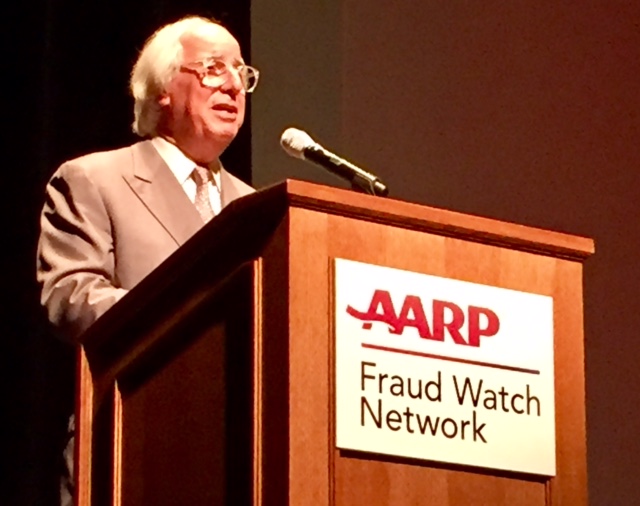AARP Eye Center

Former scam artist Frank Abagnale spent May 16 in Michigan sharing his unique expertise in a teletown hall, during media interviews and at a two-hour event attended by hundreds at the Macomb Center for the Performing Arts.
Abagnale, whose exploits were made famous in the movie "Catch Me If You Can" starring Leonardo DiCaprio, spoke during his Michigan tour about his checkered past and how to avoid becoming a victim of scams and fraud.
Here are some highlights:
- "Before I was old enough to drink, I wrote over $2 million in bad checks," he said, alluding to his criminal career between the ages of 16 and 21 when he posed as a doctor, an airline pilot, and an attorney and cashed millions in fraudulent checks.
- Referring to the recent Ransomware breach, he said "hackers don't cause breaches, people do," meaning hackers take advantage of peoples' mistakes.
- Don't use checks or debit cards to do business, he advised. If someone steals your identity and your money, you'll be the one who pays the bill. "The safest form of payment on the face of the earth is a credit card," he said, noting that credit card companies pick up the tab if a scammer gets your credit card information and uses it to make purchases.
- "Stop and verify" when someone calls asking for money, Abagnale said several times during the day. "Make sure the caller is who they say they are. It's easy to do and it can save you from losing your life's savings."
- Be careful what you put on Facebook, he warned. "We give so much information away on Facebook, scam artists take that information and that's what makes them so convincing." Scammers call posing as police asking grandparents to bail out a grandchild who has supposedly been arrested. "From Facebook, they know the grandchild's name, where he goes to school, his girlfriend's name." They use the information to win over the unsuspecting grandparent. He also warned against putting your date of birth, your hometown and a picture of yourself on social media.
- "It's nothing to be ashamed of if you've been ripped off or scammed," he said. "It can happen to anyone. You have to share that information with loved ones or the police so something can be done about it and they don't scam anyone else."
- The No. 1 scam of the day is a caller posing as an IRS agent saying you owe money. The IRS doesn't call taxpayers, he noted. Be especially skeptical if someone calls saying you must settle a debt immediately. "That's a tip off that it's a scam," he said.
- Abagnale said con artists are running the same scams they ran 50 years ago, "they've just found different ways of delivering them. Technology makes identity theft easy."
- Scammers are tougher to catch because it's a global game, he said. "They're sitting in their pajamas in their kitchen (in a foreign country), with a laptop or a phone. Even when we know who's doing it we don't have the legal ability to go and arrest them. They're thousands of miles away."
- Shred everything. "Use a micro-cut shredder," he advised.
- "If you make it easy to steal from you, you're probably going to be a victim. We need to be a little smarter, a little wiser. Education is the most powerful tool for fighting crime."
Abagnale served time for crimes in France, Sweden and the U.S. He served only four years of a 12-year sentence before the U.S. government offered to let him out to work for the FBI to help catch the scammers. He has been an employee or consultant for the FBI for 41 years.
He has been an AARP Fraud Watch Network ambassador for three years and will visit 12 states this year to spread the word about avoiding scams. To learn more, go to aarp.org/fraudwatchnetwork































































